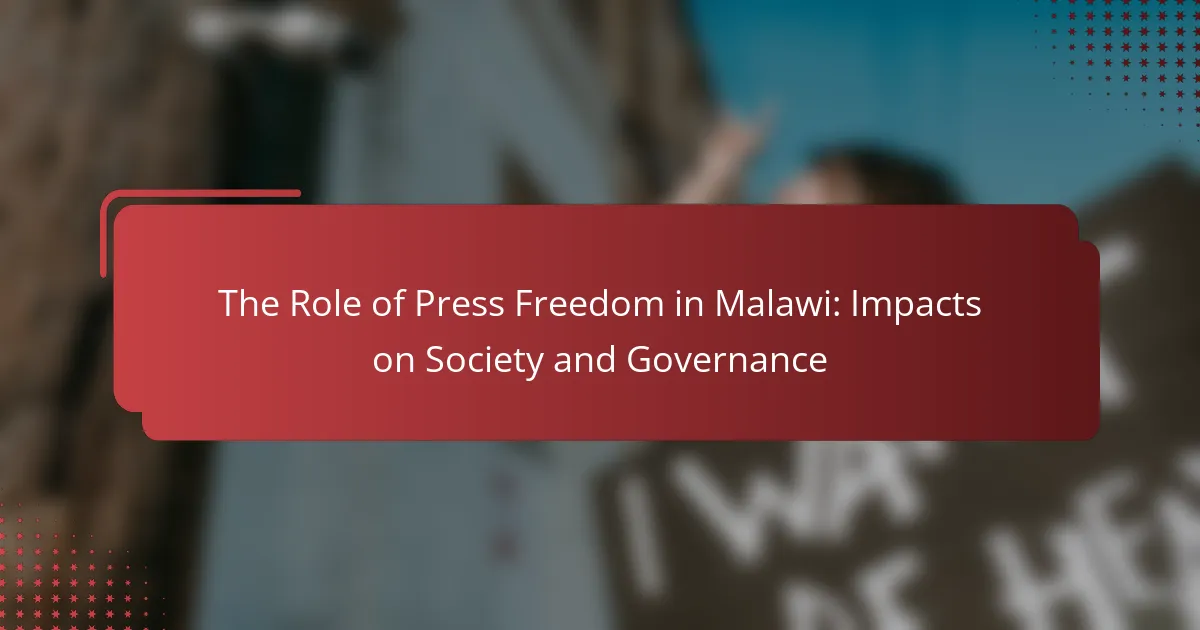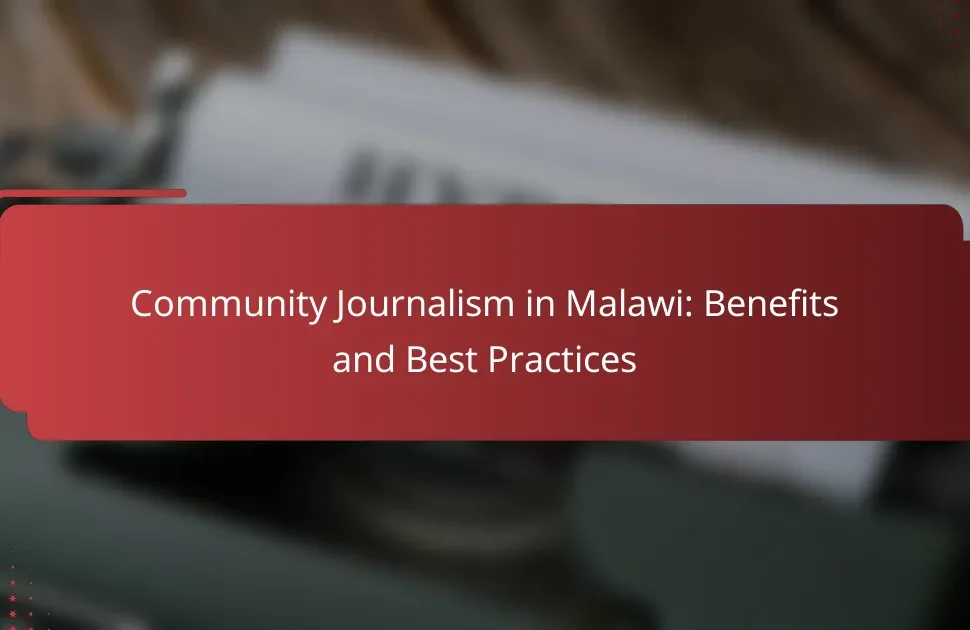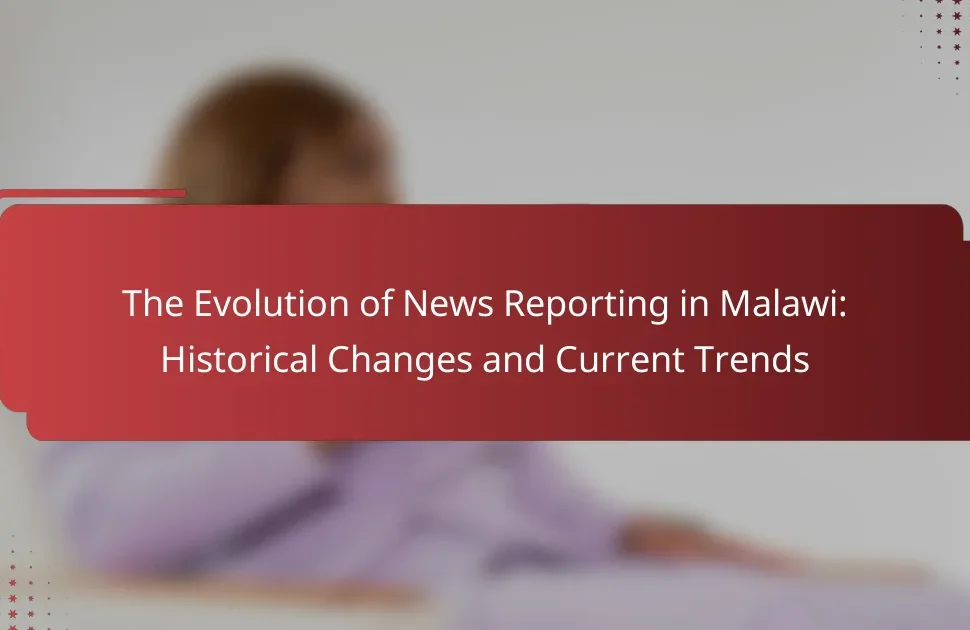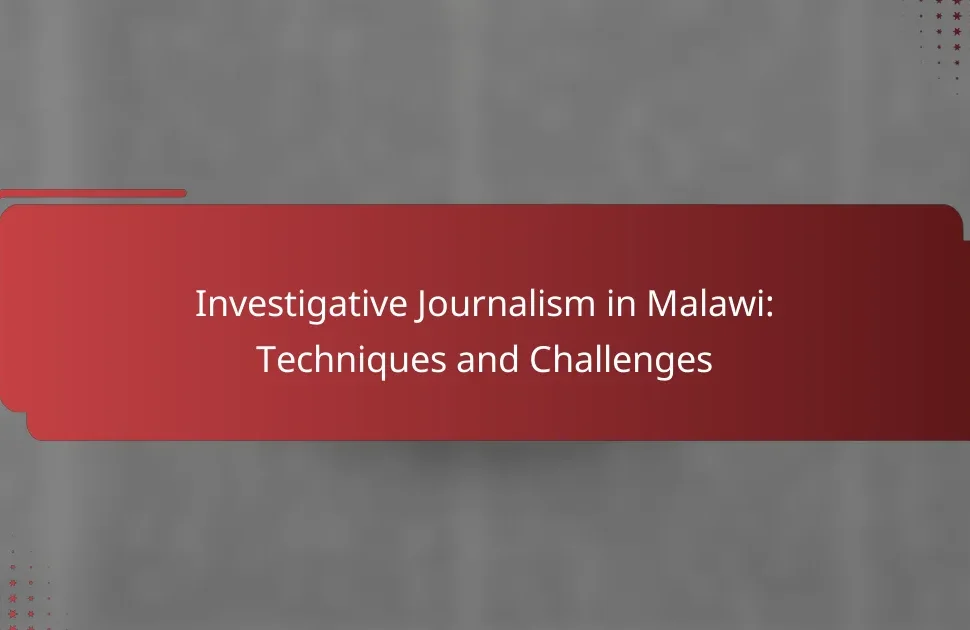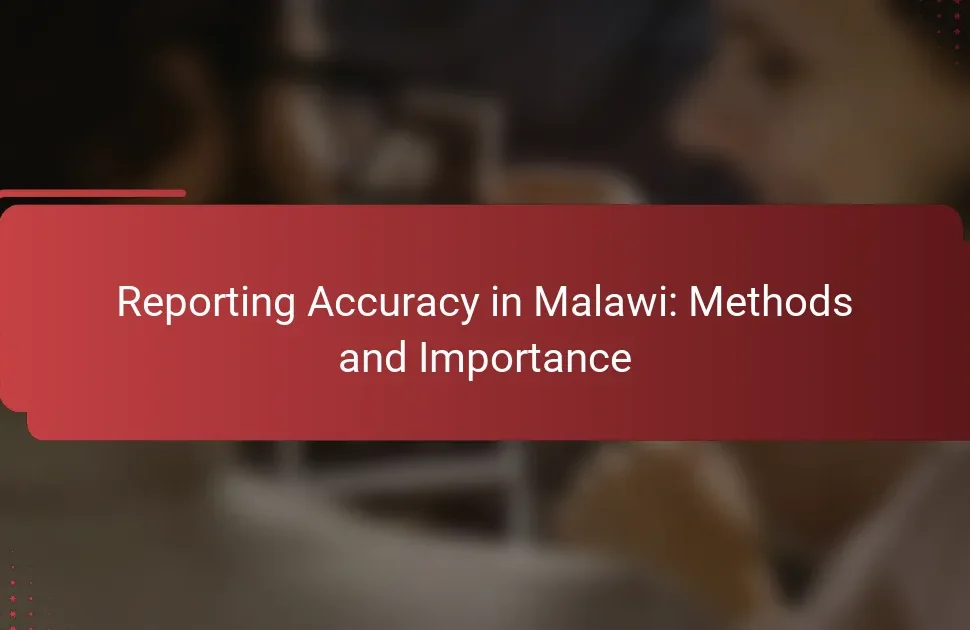Press freedom in Malawi is essential for promoting democracy, accountability, and informed citizenry. It enables the dissemination of diverse opinions and serves as a watchdog against government corruption and abuse of power. Despite facing challenges such as government censorship and intimidation, journalists in Malawi continue to advocate for transparency and uphold the right to freedom of expression. Recent developments indicate a cautious optimism for the future of press freedom, driven by public demand for accountability and ongoing legislative reforms aimed at enhancing media independence. However, challenges like political pressures and self-censorship persist, necessitating ongoing efforts to protect journalists and strengthen democratic institutions.
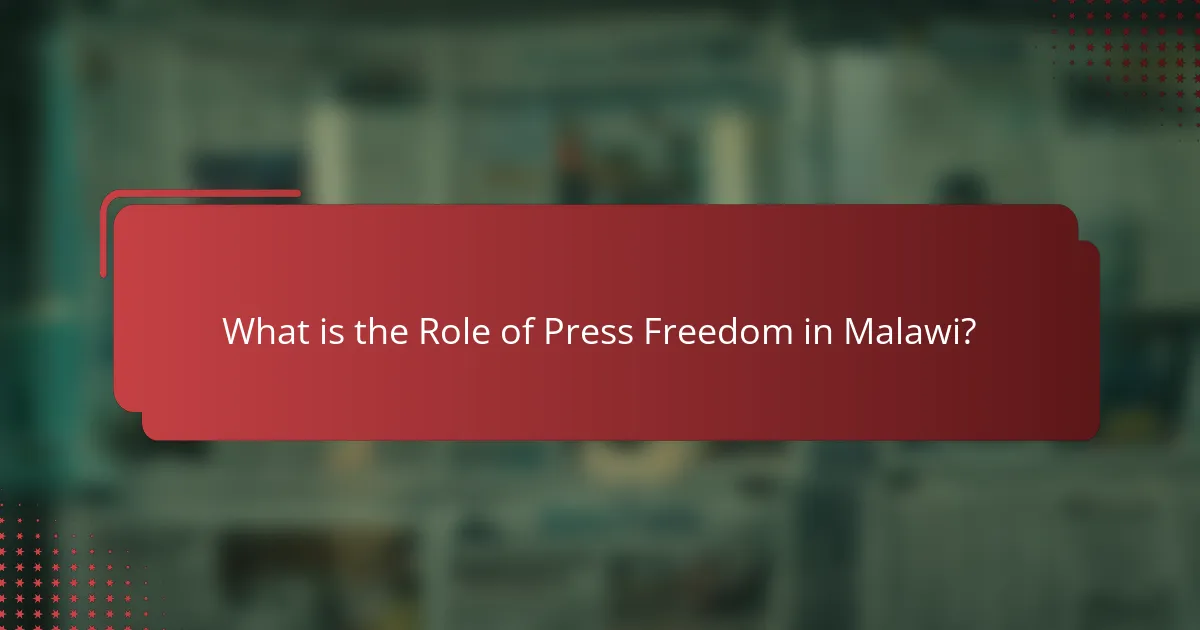
What is the Role of Press Freedom in Malawi?
Press freedom in Malawi plays a crucial role in promoting democracy and accountability. It allows for diverse opinions and information dissemination. A free press enables citizens to make informed decisions. It serves as a watchdog against government corruption and abuse of power. In Malawi, press freedom has been challenged by government censorship and intimidation. Despite these challenges, journalists continue to advocate for transparency. The Media Institute of Southern Africa reports ongoing struggles for press rights. Overall, press freedom is essential for fostering an informed society in Malawi.
How does press freedom influence societal dynamics in Malawi?
Press freedom significantly influences societal dynamics in Malawi by promoting transparency and accountability. It allows citizens to access information about government actions and policies. This access fosters public debate and civic engagement. A free press also acts as a watchdog against corruption. For instance, investigative journalism has exposed government malfeasance in Malawi. Furthermore, press freedom encourages diverse viewpoints, contributing to a more informed electorate. In 2020, Malawi’s presidential election showcased the impact of media coverage on voter awareness. Overall, press freedom enhances democratic processes and strengthens civil society in Malawi.
What are the historical contexts of press freedom in Malawi?
Press freedom in Malawi has evolved through significant historical contexts. Initially, during colonial rule, the press faced strict censorship and limited freedom. This changed after Malawi gained independence in 1964. However, under President Hastings Kamuzu Banda’s regime, press freedom was severely restricted. The government controlled media outlets and suppressed dissenting voices.
In 1993, a referendum led to the end of one-party rule. This transition marked a new era for press freedom in Malawi. The adoption of a new constitution in 1994 guaranteed freedom of expression. The media landscape expanded with the emergence of private newspapers and radio stations.
Despite these advancements, challenges remain. Journalists often face intimidation and threats. The government has occasionally used laws to silence critical reporting. Overall, the historical context of press freedom in Malawi reflects a journey from repression to gradual liberation, with ongoing struggles for true independence in the media.
How has press freedom evolved over time in Malawi?
Press freedom in Malawi has evolved significantly since the early 1990s. Prior to this period, press freedom was heavily restricted under a one-party state. The introduction of multiparty democracy in 1994 marked a turning point for media freedom. Laws restricting press activities were repealed, allowing for a more vibrant media landscape.
In the late 1990s and early 2000s, private media outlets emerged, enhancing public access to diverse viewpoints. However, challenges persisted, including government interference and threats to journalists. The 2010s saw a mix of improvements and setbacks, with the government occasionally imposing restrictions on media operations.
Recent years have witnessed ongoing debates about the balance between press freedom and national security. Despite these challenges, Malawi’s media continues to play a crucial role in promoting transparency and accountability. The evolution of press freedom reflects broader societal changes and the ongoing struggle for democratic governance in Malawi.
Why is press freedom crucial for governance in Malawi?
Press freedom is crucial for governance in Malawi because it promotes transparency and accountability. A free press enables citizens to access information about government actions and policies. This access empowers the public to hold leaders accountable for their decisions. Furthermore, it fosters informed debate and discussion, essential for a functioning democracy. Historical examples show that when press freedom is restricted, corruption often flourishes. In Malawi, the media has played a vital role in exposing government misconduct. Studies indicate that countries with robust press freedom experience lower levels of corruption. Thus, press freedom is integral to effective governance in Malawi.
What are the implications of press freedom on political accountability?
Press freedom significantly enhances political accountability. It allows the media to investigate and report on government actions. This scrutiny helps expose corruption and abuse of power. For instance, in Malawi, investigative journalism has revealed mismanagement of public funds. Such revelations lead to public outcry and demand for accountability. Studies show that countries with higher press freedom tend to have lower levels of corruption. In Malawi, the media’s role in reporting on political issues has prompted government responses. Therefore, press freedom serves as a vital check on political authority.
How does press freedom impact the rule of law in Malawi?
Press freedom significantly enhances the rule of law in Malawi. It promotes transparency and accountability in government actions. When the press operates freely, it can investigate and report on corruption and abuse of power. This scrutiny helps to uphold legal standards and protect citizens’ rights. A 2021 report by Freedom House indicated that countries with higher press freedom tend to have stronger legal frameworks. In Malawi, increased media coverage of legal issues has led to public awareness and engagement. This engagement encourages citizens to demand justice and hold authorities accountable. Thus, press freedom is essential for reinforcing the rule of law in Malawi.
What challenges does press freedom face in Malawi?
Press freedom in Malawi faces significant challenges, including government censorship and intimidation. Journalists often encounter harassment and threats for reporting on sensitive issues. The legal framework also restricts media operations, with laws that limit freedom of expression. Additionally, economic pressures impact the sustainability of independent media outlets. These challenges hinder the ability of the press to operate freely and hold power accountable. Reports indicate that these issues have intensified in recent years, affecting the overall media landscape in Malawi.
What legal restrictions affect press freedom in Malawi?
Legal restrictions affecting press freedom in Malawi include laws that limit freedom of expression and impose penalties on media outlets. The Penal Code contains provisions against defamation and false news, which can lead to imprisonment. The Access to Information Act has not been fully implemented, hindering transparency. The Communications Act allows the government to regulate content and impose fines. Additionally, journalists face harassment and intimidation, which further restricts their ability to report freely. These laws and practices create a challenging environment for press freedom in Malawi.
How do societal attitudes influence press freedom in Malawi?
Societal attitudes significantly influence press freedom in Malawi. Positive public support for independent journalism fosters a more open media environment. Conversely, negative attitudes toward dissent can lead to increased censorship. In Malawi, societal fear of government retaliation often suppresses critical reporting. This dynamic is evident in instances where journalists face harassment for covering sensitive topics. Furthermore, public demand for accountability can empower the press to challenge authority. However, when societal norms prioritize loyalty over truth, press freedom diminishes. Thus, the interplay of societal attitudes and press freedom shapes Malawi’s media landscape.
How does press freedom affect public participation in Malawi?
Press freedom significantly enhances public participation in Malawi. It allows citizens to access diverse information and express their opinions freely. When the press operates independently, it fosters informed discussions on governance and societal issues. This transparency encourages citizens to engage in political processes and community matters. Studies indicate that higher press freedom correlates with increased voter turnout and civic activism. For instance, the 2020 presidential elections in Malawi saw heightened public involvement partly due to robust media coverage. Thus, press freedom serves as a vital mechanism for empowering citizens and promoting democratic engagement in Malawi.
What role does the media play in fostering civic engagement?
The media plays a crucial role in fostering civic engagement by informing the public about issues that matter to them. It provides a platform for discussion and debate on political, social, and economic topics. Through news reports, opinion pieces, and investigative journalism, the media educates citizens about their rights and responsibilities. This information empowers individuals to participate in democratic processes, such as voting and advocacy. Studies show that countries with a free press tend to have higher levels of civic participation. For example, a 2019 study by the International Journal of Press/Politics found that media exposure correlates with increased voter turnout in Malawi. Thus, the media serves as a vital link between the government and citizens, encouraging active involvement in governance.
How can press freedom enhance public awareness and education?
Press freedom enhances public awareness and education by providing access to diverse information. It allows journalists to investigate and report on issues affecting society. This transparency fosters informed citizenry and encourages public discourse. For instance, in Malawi, independent media has exposed corruption and government inefficiencies. Such revelations empower citizens to hold leaders accountable. Moreover, press freedom promotes critical thinking by presenting multiple viewpoints. A well-informed public is better equipped to engage in democratic processes. Studies show that countries with free press have higher levels of civic participation. Therefore, press freedom is essential for an educated and aware populace.
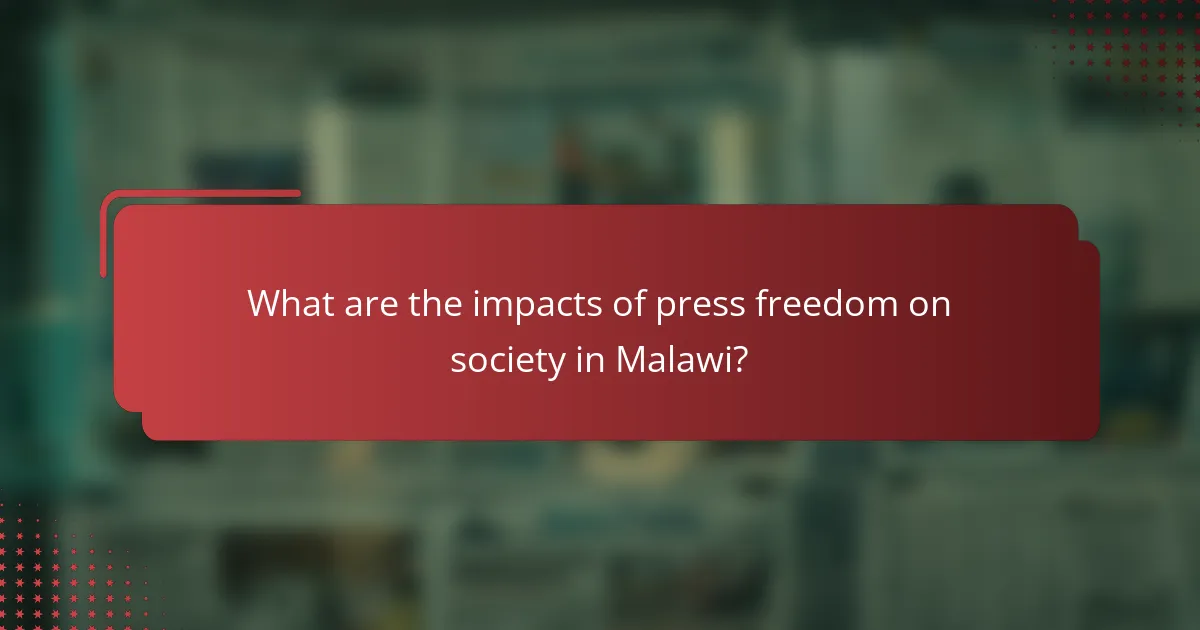
What are the impacts of press freedom on society in Malawi?
Press freedom in Malawi significantly impacts society by promoting transparency and accountability. It enables citizens to access information critical for informed decision-making. This access supports democratic governance and encourages civic engagement. Additionally, a free press acts as a watchdog, exposing corruption and human rights abuses. Reports from organizations like Reporters Without Borders highlight that press freedom fosters public debate and discourse. In turn, this contributes to a more informed electorate. Furthermore, press freedom can lead to social change by empowering marginalized voices. Overall, the presence of a free press strengthens democratic institutions in Malawi.
How does press freedom contribute to social change in Malawi?
Press freedom contributes to social change in Malawi by enabling open discourse and accountability. It allows citizens to express their views and engage in discussions about governance and social issues. A free press investigates corruption and human rights abuses, informing the public and prompting action. For instance, the rise of independent media has led to increased scrutiny of government actions. This scrutiny fosters civic engagement and encourages citizens to demand transparency. Additionally, press freedom empowers marginalized voices, promoting inclusivity in societal debates. Overall, a vibrant media landscape drives social progress in Malawi by facilitating informed citizen participation.
What examples illustrate the impact of press freedom on social issues?
Press freedom significantly impacts social issues by promoting transparency and accountability. In Malawi, investigative journalism has exposed corruption in government. For instance, the 2014 “Cashgate” scandal revealed the misappropriation of public funds, leading to public outcry and government reforms. Additionally, press coverage of human rights abuses has raised awareness and mobilized civil society. The media’s role in reporting on health crises, such as the cholera outbreak, has informed the public and prompted government action. These examples demonstrate how a free press can drive social change and influence governance in Malawi.
How does press freedom support marginalized voices in Malawi?
Press freedom supports marginalized voices in Malawi by providing a platform for diverse perspectives. It allows underrepresented groups to share their stories and challenges. This visibility can lead to increased awareness and advocacy for their rights. In Malawi, independent media outlets often highlight issues faced by marginalized communities. For instance, reports on gender inequality and human rights abuses empower these groups. Additionally, press freedom encourages public discourse, fostering dialogue between marginalized communities and policymakers. Studies show that countries with higher press freedom scores typically see greater civic engagement among marginalized populations. Thus, press freedom is crucial for amplifying voices that might otherwise remain unheard.
What role does press freedom play in shaping public opinion?
Press freedom significantly influences public opinion by providing access to diverse viewpoints. It enables the dissemination of information that shapes perceptions and beliefs. In Malawi, a free press offers critical insights into governance and societal issues. This access empowers citizens to make informed decisions. Studies show that countries with higher press freedom correlate with more engaged and educated electorates. For instance, the 2020 Malawi elections saw increased voter turnout linked to independent media coverage. Thus, press freedom is essential for fostering an informed public and enhancing democratic participation.
How does media coverage influence public perceptions of governance?
Media coverage significantly shapes public perceptions of governance. It informs citizens about government actions and policies. Positive coverage can enhance public trust in governance. Conversely, negative coverage may lead to skepticism and distrust. Research by the Pew Research Center shows that 64% of Americans believe news coverage influences their views on government performance. In Malawi, media coverage often highlights corruption and inefficiency. This can mobilize public opinion against government officials. Effective media scrutiny promotes accountability and transparency. Thus, media serves as a critical intermediary in shaping governance perceptions.
What are the effects of misinformation on public opinion in Malawi?
Misinformation significantly influences public opinion in Malawi. It can distort perceptions of political issues and leaders. For instance, false narratives can lead to mistrust in government institutions. This erosion of trust affects civic engagement and participation. Research shows that misinformation can create polarization among different social groups. In Malawi, this polarization can manifest in heightened tensions during elections. A study by the Afrobarometer in 2020 highlighted that misinformation impacted voter behavior and preferences. The spread of false information often occurs through social media platforms, where it can reach a wide audience rapidly. This rapid dissemination complicates efforts to promote informed public discourse.
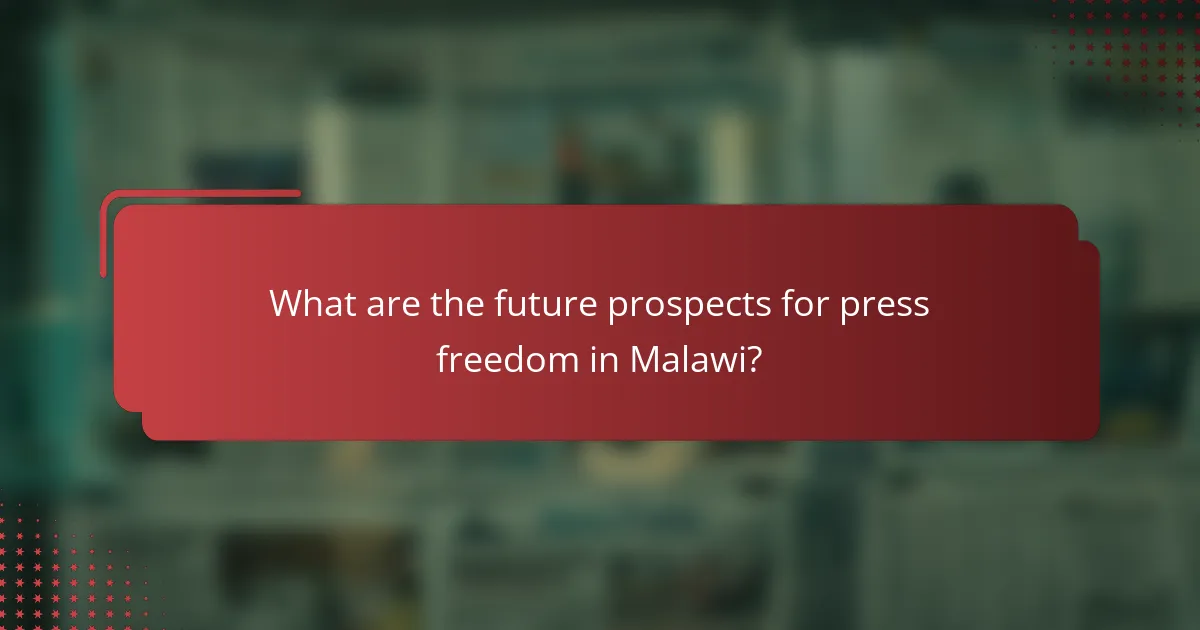
What are the future prospects for press freedom in Malawi?
The future prospects for press freedom in Malawi appear cautiously optimistic. Recent developments show a growing public demand for transparency and accountability. The government has made commitments to uphold constitutional rights, including freedom of expression. Legislative reforms are underway to enhance media independence. However, challenges remain, such as political pressures and threats against journalists. Reports indicate an increase in self-censorship among media professionals. International organizations continue to advocate for stronger protections for journalists. Overall, while progress is being made, sustained efforts are needed to ensure press freedom in Malawi.
What reforms are necessary to strengthen press freedom in Malawi?
Legal reforms are necessary to strengthen press freedom in Malawi. Revising restrictive laws, such as the Access to Information Act, can enhance transparency. Establishing independent regulatory bodies can ensure fair media practices. Protecting journalists from harassment and violence is crucial for their safety. Promoting media literacy among the public can foster a more informed citizenry. Encouraging diverse ownership of media outlets can prevent monopolies and promote pluralism. Increased government accountability can create an environment where the press operates freely. Historical context shows that countries with robust press freedom tend to have stronger democracies.
How can civil society organizations support press freedom initiatives?
Civil society organizations can support press freedom initiatives by advocating for legal reforms. They can lobby for laws that protect journalists from harassment and censorship. Additionally, these organizations can provide training for journalists on ethical reporting and safety practices. They can also raise public awareness about the importance of press freedom. By organizing campaigns, they can mobilize community support for independent media. Furthermore, civil society organizations can monitor press freedom violations and document abuses. They can collaborate with international bodies to apply pressure on governments that restrict press freedom. These actions contribute to a more robust and free press environment.
What role does international support play in enhancing press freedom?
International support plays a crucial role in enhancing press freedom. It provides resources, training, and advocacy for journalists in oppressive environments. This support helps to establish legal frameworks that protect media rights. International organizations often monitor press freedom violations and hold governments accountable. For instance, the United Nations and various NGOs have conducted initiatives to promote media literacy and safety for journalists. These efforts can lead to increased public awareness and demand for press freedom. Statistics show that countries receiving international support often see improvements in media independence and public trust in journalism.
What best practices can be adopted to promote press freedom in Malawi?
Promoting press freedom in Malawi can be achieved through several best practices. Strengthening legal protections for journalists is essential. This includes reforming laws that restrict media operations and ensuring they align with international standards. Providing training and resources for journalists enhances their skills and ethical standards. Encouraging diverse media ownership can prevent monopolies and promote a range of viewpoints. Establishing independent regulatory bodies can help oversee media practices without government interference. Supporting civil society organizations that advocate for press freedom is crucial. Finally, fostering public awareness campaigns can educate citizens about the importance of a free press. These practices collectively contribute to a more robust and independent media landscape in Malawi.
How can journalists ensure ethical reporting in challenging environments?
Journalists can ensure ethical reporting in challenging environments by adhering to established ethical guidelines. They should prioritize accuracy and verify facts before publication. Maintaining transparency about sources and potential biases is essential. Journalists must also consider the potential impact of their reporting on vulnerable communities. Engaging with local stakeholders can provide context and enhance understanding. Training in conflict-sensitive journalism can help navigate difficult situations. Moreover, protecting the identities of sources can safeguard them from repercussions. Ethical reporting fosters trust and credibility, which are vital for journalism’s role in society.
What strategies can media organizations implement for sustainability?
Media organizations can implement several strategies for sustainability. Diversifying revenue streams is essential. This includes subscription models, crowdfunding, and sponsorships. Investing in digital platforms enhances reach and engagement. Training staff in multimedia skills increases content quality. Collaborating with local communities fosters trust and relevance. Utilizing data analytics helps tailor content to audience preferences. Building partnerships with other organizations can share resources and expertise. These strategies are supported by studies showing that diverse funding leads to greater resilience in media organizations.
The main entity of the article is press freedom in Malawi. The article explores the critical role of press freedom in promoting democracy, accountability, and civic engagement within Malawian society. It examines the historical evolution of press freedom, the challenges faced by journalists, and the implications for governance and the rule of law. Additionally, the article highlights how press freedom enhances public participation and supports marginalized voices, while also addressing the impact of misinformation on public opinion. Finally, it discusses future prospects and necessary reforms to strengthen press freedom in Malawi.
